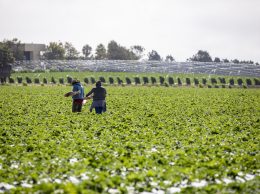Our view: Chumash deserve chance to develop Camp 4 land
IN THIS ARTICLE
- Editorials Topic
- Henry Dubroff and Editorial board Author
By Henry Dubroff and Editorial board Friday, January 27th, 2017

The area known as Camp 4 is now part of the Santa Ynez Band of Chumash Indians reservation.
The Santa Ynez Band of Chumash Indians took a big step toward self-sufficiency on Jan. 23 when the Bureau of Indian Affairs placed a prime Santa Ynez Valley property into a trust that clears the way for housing, vineyards and open space development.
Technically known as Camp 4, the 1,390-acre property is scheduled for 143 homes, giving tribal members a path to future home ownership. County officials declined to negotiate a deal that may have earned them a portion of the millions of dollars in property tax revenue they would have earned if the land had remained on county rolls.
Now the property will be part of the tribe’s sovereign territory and not subject to taxes.
As we’ve argued before on these pages, until the Spanish Mission culture arrived, all of the land on the Central Coast was occupied by the Chumash. The assertion of property rights by tribal leaders Vincent Armenta and Kenneth Kahn is, in reality, an expression of development rights that are fully within the law. As Kahn noted in a statement, it marks “a significant milestone in the tribe’s history.”
County officials are miffed they are losing out on some $300 million in future property taxes but they’ve had plenty of opportunity during the three years since the initial filing of the trust application to make alternative arrangements such as collecting fees in lieu of taxes.
There’s plenty of regulatory detail to be worked out about utilities, traffic flow and construction access before the tribe’s dreams for Camp 4 become a reality. And the project is going to need some form of financing. But the BIA’s decision was one of the biggest steps forward since the late Fess Parker sold the land to the Chumash for an estimated $40 million in 2010.
The Santa Ynez Valley is not the only place in the Tri-Counties where political changes are afoot. San Luis Obispo County has elected a pro-growth majority to its Board of Supervisors for the first time in years and Ventura County supervisors are split 2-2 on most growth issues with Oxnard’s John Zaragoza as the swing vote.
Dow reaches post-election milestone
For anyone who remembers the stagflation of the 1970s, seeing the Dow Jones Industrial Average rise above the 20,000 mark on Jan. 25 is quite a milestone.
It was 1982 before the Dow permanently breached the 1,000 mark and it first broke 10,000 in March 1999 as the dot.com bubble was reaching its peak.
While the 20,000 crossing on the Dow is not accompanied by the euphoria of 1999, it’s worth it to strike a note or two of caution.
First, nobody can predict stock markets — not even Warren Buffet. Second, public participation in the market is at the lowest level in decades, so Dow 20K may be exacerbating the inequality that’s at the root of today’s economic anxiety.
However, for those who have been disciplined, stay-the-course investors, it was a noteworthy moment.










